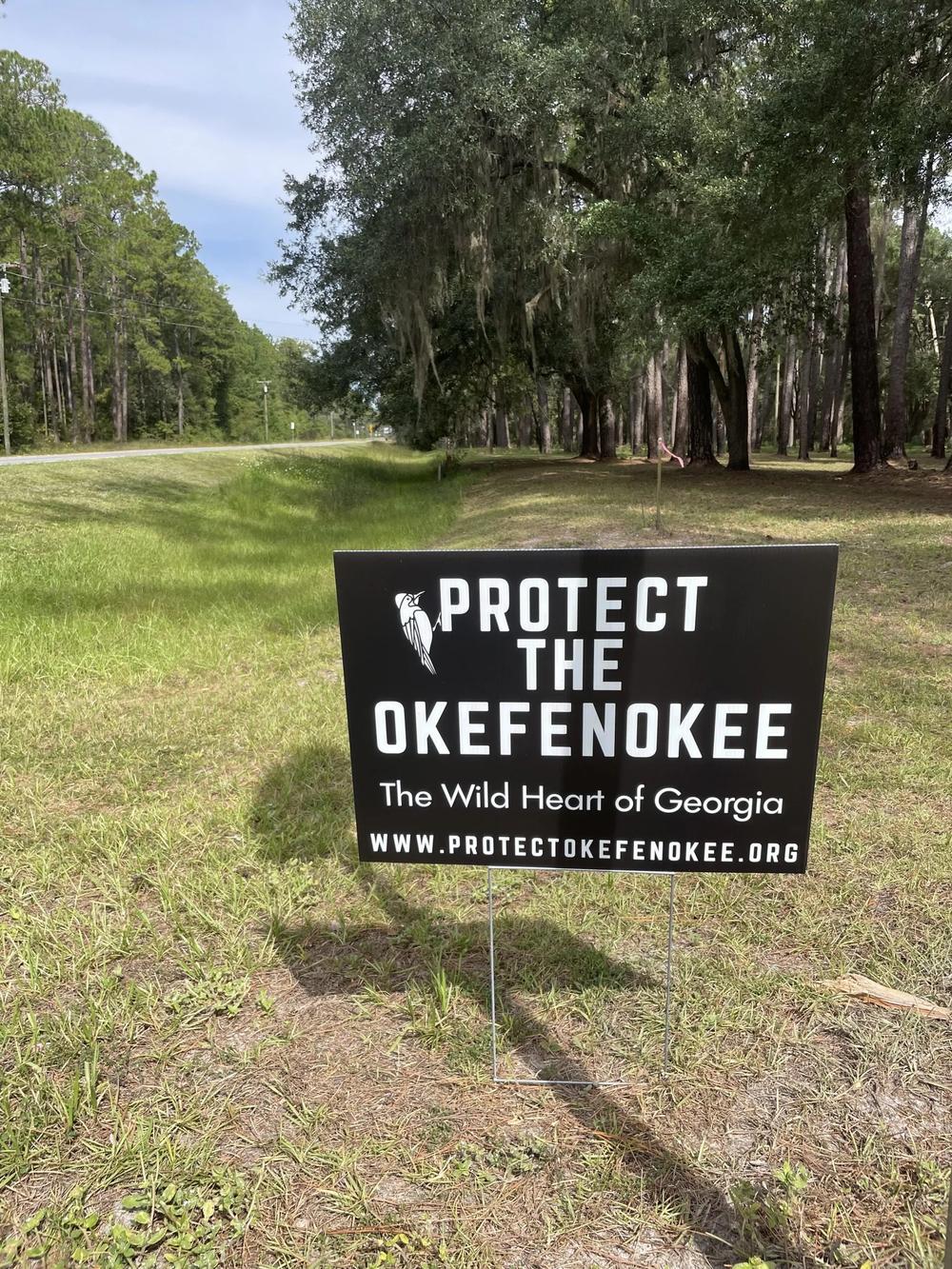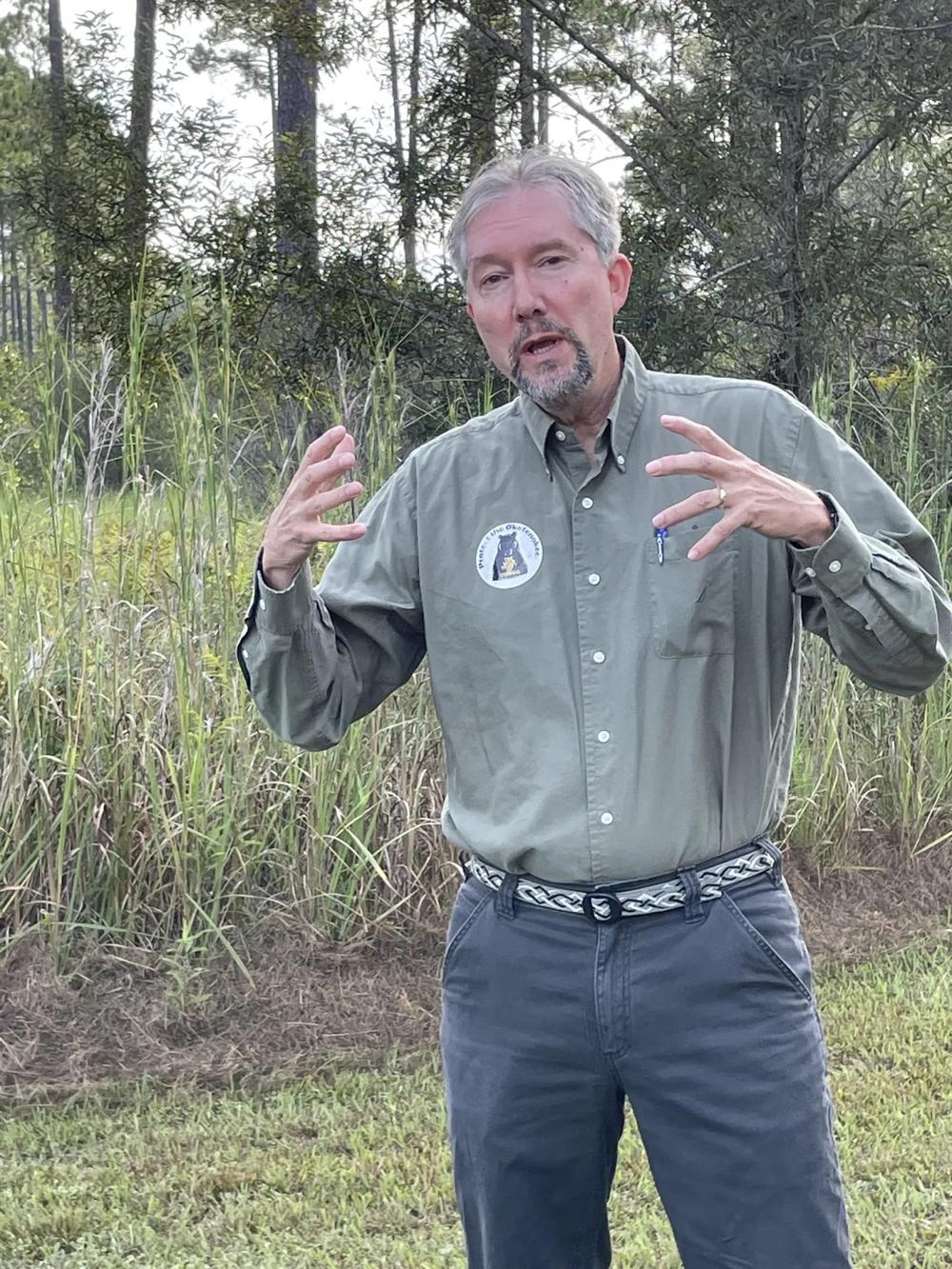
Caption
A yard sign near the entrance to the Suwanee River Eco-Lodge at Stephen Foster State Park.
Credit: Mary Landers / The Current

A yard sign near the entrance to the Suwanee River Eco-Lodge at Stephen Foster State Park.
Mary Landers, The Current
The Department of Natural Resources Board met at the Okefenokee Tuesday, but didn’t offer its collective stance on a controversial plan to mine near the blackwater swamp. A resolution on the proposal might come later, Board Chair Bill Jones suggested after the meeting.
Environmental Protection Division Deputy Director John Eunice did update the board on the permitting process for the titanium dioxide surface mine located about 3 miles from the swamp’s border. Staff is still evaluating Alabama-based Twin Pines Minerals’ applications for the four required permits: surface mining, stormwater, water withdrawal, and an air permit.
“Those conversations are ongoing and at a highly technical level. Once staff is satisfied that the mine land use plan is completed, it will be placed on a public notice for a 60-day public comment period,” Eunice said at the meeting at the Suwanee River Eco-Lodge at Stephen C. Foster State Park in Fargo. He also said at least one and possibly two public hearings will be scheduled.

A man paddles at Stephen C. Foster State Park in Georgia.
Rep. Darlene Taylor, lead sponsor of the Okefenokee Protection Act during the 2022 session, expected to speak at the meeting but couldn’t attend. She shared her prepared remarks with The Current:
“I urge EPD to follow the science and the law and the will of the Georgia public and deny the permit applications for TPM’s risky project, and I urge the DNR board to pass a resolution against the project just like they did against DuPont back in the 1990s.
“And I plan to continue to work with my fellow legislators to prohibit mining on Trail Ridge so we don’t have to keep having this fight, and so we can permanently protect the Okefenokee for present and future generations.”
About a dozen people opposed to the mine attended the meeting but were not invited to speak. The mining opponents include a UGA hydrologist, a pastor from Folkston, and representatives from the Okefenokee Protection Alliance.
The board isn’t ready yet to pass a resolution as Taylor is urging, DNR Board Chairman Bill Jones told The Current after the meeting. He’s looking to the Secretary of the Interior to take the lead on the issue as then-Secretary Bruce Babbitt did 25 years ago.
“I have no idea whether the board will issue a resolution this go around or not,” said Jones, who lives on St. Simons. “A lot depends on Fish & Wildlife who obviously manages the refuge, and the interior secretary. I read her press release, she didn’t mention mining.”
Jones was referring to a press release issued after Interior Secretary Deb Haaland visited the Okefenokee on Sept. 16.

Sen. Jon Ossoff and Interior Sec. Deb Haaland toured the Okefenokee by boat in mid-September.
“So I think we need to hear we need to hear from (Fish & Wildlife and Haaland),” Jones said. “I don’t know where the board would come out on a resolution at this time. I hadn’t thought about it prior to the 60-day public comment period. When we get into that period, I’m gonna poll the board and see what the board’s thoughts are, but whether or not we issue a resolution, I don’t know. The resolution that was issued years ago didn’t stop the mine. What stopped the mine was Bruce Babbitt. And that’s what we would need to see, I think. Something really positive and strong from the interior secretary.”
Georgia law gives final permitting authority to the EPD. The 19-member board, appointed by the governor and approved by the state senate, has no authority over permits, but can exercise the power of the bully pulpit.
Rhett Jackson, a UGA professor and a leading authority on hydrogeology and groundwater modeling, spread his message about the dangers to the swamp of the proposed mining plan at a press conference that DNR law enforcement agents moved from the parking area to the EcoLodge entrance before the meeting. Among the issues he cited was the fact that Twin Pines plans to keep its processing water on site and allow it to evaporate slowly.
“Now, if you think about Hurricane Ian coming, it’s going to dump a huge amount of water on on this site very soon,” he said. “If they don’t have a way to treat and discharge water safely before a big storm like Hurricane Ian comes, then you’re just gonna get a big overflow event. And you can think about the hog lagoons in North Carolina as an example of what that can cause.

Rhett Jackson outside the Suwanee River Eco-Lodge.
“I’m not against titanium sand mining in general, there are plenty of places on the Atlantic coastal plain where this can be done safely. This is not the place. Environmental context matters. It makes no sense to do this in the earthen dam that is the reason that the swamp exists in the first place.”
Eunice, who gave the Twin Pines update to the board, said after the meeting that EPD had not hired outside consultants to examine the mining company’s modeling, but would respond to Jackson’s extensive technical comments during the 60-day comment period.
Eunice previously served as legislative director/general counsel to Sen. David Perdue until January 2021. In that capacity he was included in meetings about the Twin Pines project between Perdue staffers and the U.S. Army Corps of Engineers in Savannah, which was required to determine if there were wetlands that required protection on the property. Changing definitions of both wetlands and the scale of the project meant the Corps eventually dropped the permitting process, leaving all the permitting decisions to the state.
Eunice joined EPD in February 2021, a month after Perdue left office.
He said it wasn’t appropriate for him to comment on his previous employment matters, adding that the Twin Pines project “wasn’t anything that I was intimately involved with.”
Emails obtained from the Corps show Eunice was included in monthly calls to update the senator’s office on the permitting process in July through October of 2020. And he was the only Perdue staffer who called in for the September call. Twin Pines president Steve Ingle donated the maximum allowable amount, $2,800, to both Perdue’s primary and general election campaign in 2019.
“Well, I can assure you that the evaluation and review being done on the application here is being done in complete and total transparency and fairness,” Eunice said.
Gov. Brian Kemp has not taken a position on the mining proposal.
“I’ll have to refer you to the DNR Environmental Protection Division while their process continues to unfold,” spokesman Andrew Isenhour e-mailed Wednesday.
This story comes to GPB through a reporting partnership with The Current.